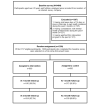The Effect of the Imacoco Care Psychoeducation Website on Improving Psychological Distress Among Workers During the COVID-19 Pandemic: Randomized Controlled Trial
- PMID: 35133972
- PMCID: PMC8949678
- DOI: 10.2196/33883
The Effect of the Imacoco Care Psychoeducation Website on Improving Psychological Distress Among Workers During the COVID-19 Pandemic: Randomized Controlled Trial
Abstract
Background: The prolonged COVID-19 pandemic has affected mental health among workers. Psychoeducational intervention via a website could be effective for primary prevention of mental illness among workers in the current COVID-19 pandemic.
Objective: The aim of this randomized controlled trial is to examine the effect of a newly developed online psychoeducational website named Imacoco Care on reducing psychological distress and fear about COVID-19 infection among workers.
Methods: Participants in the study were recruited from registered members of a web survey company in Japan. Participants who fulfilled the eligibility criteria were randomly allocated to the intervention or control group. Participants in the intervention group were invited to access the Imacoco Care program within a month after the baseline survey. The Kessler Psychological Distress Scale (K6) and the Fear of COVID-19 Scale (FCV-19S) scores were obtained at baseline and at 1- and 3-month follow-ups.
Results: A total of 1200 workers were randomly allocated to the intervention and control groups (n=600 [50%] per group). The Imacoco Care intervention group showed a significant favorable effect on K6 scores (P=.03) with a small effect size (ES; Cohen d=-0.14) and an adverse effect on FCV-19S scores (P=.01) with a small ES (Cohen d=0.16) at 3-month follow-up. In the per protocol analysis (including only participants who had read the Imacoco Care content at least 1 time), the Imacoco Care intervention group also showed a significant favorable effect on reducing K6 scores (P=.03), while an adverse effect on FCV-19S scores was not significant (P=.06) in the intervention group at 3-month follow-up.
Conclusions: A web-based psychoeducation approach may be effective for improving psychological distress among workers; however, it may be important not only to distribute information but also to encourage active engagement with the content of the program to prevent adverse effects of psychoeducational intervention.
Trial registration: University Hospital Medical Information Network Clinical Trials Registry (UMIN-CTR) UMIN000042556; https://upload.umin.ac.jp/cgi-open-bin/ctr_e/ctr_view.cgi?recptno=R000048548.
Keywords: COVID-19; digital health; education; health intervention; internet-based intervention; mental health; occupational groups; psychoeducation; psychological distress.
©Kotaro Imamura, Natsu Sasaki, Yuki Sekiya, Kazuhiro Watanabe, Asuka Sakuraya, Yutaka Matsuyama, Daisuke Nishi, Norito Kawakami. Originally published in JMIR Formative Research (https://formative.jmir.org), 10.03.2022.
Conflict of interest statement
Conflicts of Interest: NK reports grants from Fujitsu Ltd and TAK Ltd and personal fees from the Occupational Health Foundation, the Japan Dental Association, Sekisui Chemicals, the Junpukai Health Care Center, and the Osaka Chamber of Commerce and Industry, outside the submitted work.
References
-
- Saragih ID, Tonapa SI, Saragih IS, Advani S, Batubara SO, Suarilah I, Lin C. Global prevalence of mental health problems among healthcare workers during the Covid-19 pandemic: a systematic review and meta-analysis. Int J Nurs Stud. 2021 Sep;121:104002. doi: 10.1016/j.ijnurstu.2021.104002.S0020-7489(21)00149-8 - DOI - PMC - PubMed
-
- Olaya B, Pérez-Moreno M, Bueno-Notivol J, Gracia-García P, Lasheras I, Santabárbara J. Prevalence of depression among healthcare workers during the COVID-19 outbreak: a systematic review and meta-analysis. J Clin Med. 2021 Jul 30;10(15):3406. doi: 10.3390/jcm10153406. https://www.mdpi.com/resolver?pii=jcm10153406 jcm10153406 - DOI - PMC - PubMed
-
- Raoofi S, Pashazadeh Kan F, Rafiei S, Khani S, Hosseinifard H, Tajik F, Masoumi M, Raoofi N, Ahmadi S, Aghalou S, Torabi F, Dehnad A, Hoseinipalangi Z, Rezaei S, Shabaninejad H, Ghashghaee A. Anxiety during the COVID-19 pandemic in hospital staff: systematic review plus meta-analysis. BMJ Support Palliat Care. 2021 Jul 26;:1–9. doi: 10.1136/bmjspcare-2021-003125.bmjspcare-2021-003125 - DOI - PubMed
-
- Sahebi A, Abdi K, Moayedi S, Torres M, Golitaleb M. The prevalence of insomnia among health care workers amid the COVID-19 pandemic: an umbrella review of meta-analyses. J Psychosom Res. 2021 Oct;149:110597. doi: 10.1016/j.jpsychores.2021.110597. http://europepmc.org/abstract/MED/34388380 S0022-3999(21)00242-7 - DOI - PMC - PubMed
LinkOut - more resources
Full Text Sources


